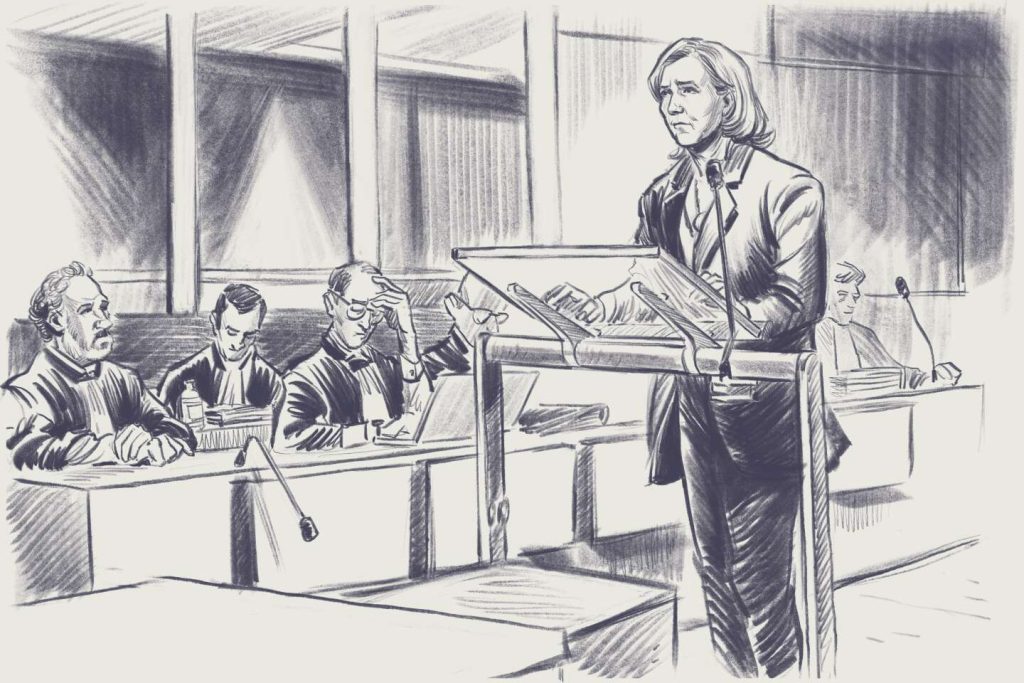The trial of assistants of the Front National at the European Parliament began in Paris on September 30, 2024. The defense attempted to delay the trial in accordance with judicial procedure, resulting in a lengthy and dull process for the 19 defendants present. Marine Le Pen, dressed in an elegant navy blue suit, chose not to disclose her address to avoid potential issues and distracted herself by searching for a chocolate bar during breaks. Six MEPs were absent, including Louis Aliot and Yann Le Pen, while two others, Jean-François Jalkh and Jean-Marie Le Pen, had their trials postponed for different reasons. Jean-Marie Le Pen was filmed singing Nazi songs with a rock group, prompting Marine Le Pen to announce plans to sue for abuse of vulnerability.
During the trial, attorney Robert Apéry initiated proceedings by requesting a delay for his client Fernand Le Rachinel, an 82-year-old printer with a contentious history with the party, on the grounds that the charges against him were intertwined with those against Jean-Marie Le Pen. However, upon realizing that his client was scheduled to be questioned, Apéry withdrew his request. The president, Bénédicte de Perthuis, clarified that the request had not been rejected as Le Pen’s case had only been separated a few moments prior. Another attorney, Patrick Maisonneuve, representing the European Parliament as a civil party, questioned the purpose of the request. Attorney Laurent de Caunes, representing former MEP Marie-Christine Boutonnet, raised a constitutional issue regarding the application of article 432-15 of the penal code to European parliamentarians, arguing that it needed clarification from the Constitutional Council.
De Caunes argued that the penal code, which criminalizes those in positions of authority or carrying out public duties, does not explicitly include European parliamentarians. The prosecutor noted that the argument had been rejected by the Court of Cassation on three occasions, leading the tribunal to dismiss the constitutional question. The trial continued with cross-examinations and testimonies from witnesses. The defense sought to challenge the charges against their clients, claiming lack of clarity in the legal basis for prosecution. The proceedings were expected to continue for several days, with a focus on unraveling the alleged system of organized misuse of funds within the Front National party.
The trial shed light on the inner workings of the Front National and its alleged financial misconduct, involving misappropriation of public funds by MEPs and their assistants. Marine Le Pen’s presence in court and her response to her father’s behavior added a personal touch to the proceedings, highlighting the rifts within the party’s leadership. The legal battle over the accountability of European parliamentarians and the interpretation of the law governing their conduct became a focal point of the trial. The defense’s attempts to postpone and challenge the charges reflected a broader struggle to confront allegations of corruption and abuse of power within the political establishment.
Overall, the trial of assistants of the Front National at the European Parliament symbolized a key moment in the fight against corruption in French politics. The legal proceedings brought to light the challenges in holding elected officials accountable for their actions and the complexity of prosecuting cases involving misuse of public funds. The courtroom drama, involving prominent political figures and their legal representatives, underscored the importance of upholding transparency and integrity in the public sphere. As the trial continued, the spotlight remained on Marine Le Pen and the future implications of the case on the Front National party.


